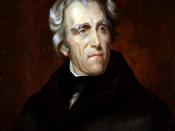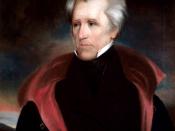Andrew Jackson was the seventh president of the United States. A rough-hewn military
hero, he was regarded by many as the spokesman of the common man. He entered the White
House in 1829 after winning the second of two vigorously fought election campaigns. Through
his forceful personality, he restructured the office of the president and helped shape the
democratic party.
Less educated and less schooled in government than many of his political opponents,
Jackson had leaped to national fame in the War of 1812 as the hero of the Battle of New Orleans
and had captured the dedicated loyalty of a vast segment of the American population. He was
widely acclaimed as the symbol of what the new American thought himself to be a self-made
man endowed with virtue and strength. The results of the election of 1824 proved that Jackson
was indeed the champion of a popular majority.
Jackson's administrations were highlighted by the frustration of sectional attempts to
weaken the central government by state nullification of federal law, and by his confrontation
with the Bank of the U.S.
Jackson also positively affected the development of the U.S.
presidency. He concentrated power in the office through wide use of the veto and through his
insistence that the chief executive alone represented the will of the whole nation. He committed
the presidential powers to the protection of the people.
Throughout his presidency, Jackson was portrayed as both a states' rightist and as a
nationalist. As a states' rightist, he proteced the states rights so that the federal government
would not fund individual states' rights and favor them over other states. He was a strong
believer in the political ideas of the Jeffersonians. Another example of Jackson being a states'
rightist includes the Maysville Road veto. Jackson had pledged to reduce...


